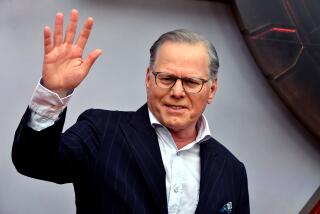TED TURNER : New MGM Owner to Focus on Big Debt
- Share via
Ted Turner set out cheerfully Wednesday for the Metro-Goldwyn-Mayer movie lot in Culver City, where he aimed to “kick the tires” of his brand new toy--even as he continues talks with “prospective buyers/investors” for at least some of MGM’s assets.
Sure, he would like to make pictures (“Who wouldn’t?”), the 47-year-old Atlantan said in an interview at the Beverly Wilshire the morning after he officially became MGM’s owner.
But he stressed that his top priority, as dictated by necessity, is to chop about $600 million off his corporate debt load, which the MGM purchase escalated overnight to more than $1.75 billion from about $250 million. To that end he has been in preliminary discussions with “various” prospective buyers, whose identity he said is best kept confidential at present.
Turner did, however, acknowledge that he met here Tuesday with former 20th Century Fox owner Marvin Davis, but he would not say whether Davis is a contender for a key role in MGM’s future.
The timing of their meeting was made more intriguing by the disclosure Tuesday that Davis had made, and been turned down on, a $3.75-billion “friendly” bid to buy CBS Inc. His reported partner in that proposed deal was Prudential Insurance Co. of America, which so far has refused to confirm or deny it.
While dealing with the staggering debt is on center stage, Turner said he would “also like to remain involved in the ongoing production of television programs and motion pictures” at MGM.
Turner said the easiest and “most probable scenario” for retiring the $600 million in escalating-interest notes used in the financing is to sell most of the MGM assets except the film library. That library of classic films was his chief reason for buying the company.
However, a wholesale disposal of assets is “not engraved in stone,” Turner said, claiming that there are “a number of ways of getting $600 million.”
And, as Turner watchers know, he did not become known as one of the nation’s brashest and most publicly intriguing communications tycoons by playing it safe.
Through his 80% stake in Turner Broadcasting System, which now owns MGM, he has been widely credited with revolutionizing cable news and satellite-fed television with his WTBS “superstation” and his Cable News Network in less than a decade. (An avid sports figure, he also owns Atlanta’s professional baseball and basketball teams).
Style Toned Down
Turner’s readiness with opinions and his brash manner over the years earned him the sobriquet “Mouth of the South.” But his style seems to have been toned down by a year of corporate hardball--first, his unsuccessful takeover bid for CBS, and then the agonizing struggle to complete financing for MGM.
Turner even conceded that “we are relatively small financially” for the size of the MGM acquisition.
“Nobody can do everything,” he said, almost fatalistically. “There is a limit. The question is, is there a way to structure this so we can be involved (in movie making). There’s no way we can do it without having a partner, or getting some backing, but that is a possibility.
“And it would be the preferred possibility, the preferred course of action. But No. 1, we got to pay off that $600 million.”
Asked if it would be a hard choice whether to sell most of MGM or interests in his Atlanta holdings, Turner indicated that he has not yet been so bedazzled by Hollywood as to lose sight of one major fact of life here.
“Well, not really,” he replied. “WTBS and CNN are pretty solid. They are predictable--like the newspaper business. The movie business is up and down.
“It depends on your skills, and we have the utmost confidence in Laddie (MGM Chairman Alan Ladd Jr.) and his team, but you’ve got to have some luck, too, in that business. It’s like sports, like baseball; nobody wins every year in baseball, and movies are the same way. It’s much less stable and predictable.”
Warming to the subject, Turner said the problem is that the bulk of the movie-going audience is “kids, and it’s hard to predict what kids are going to like. . . . The movie business is a tough business, and I don’t have personally the background that all these people like Sid Sheinberg and Barry Diller (movie moguls at MCA and Fox, respectively) have.”
But the combined library of classic MGM, Warner Bros. and RKO films that he has acquired, Turner said, brightening, is like “a savings account in a bank.”
He called the trove of films “the Rembrandts of the programming business . . . 35% of all the classic movies ever made.”
With typical effusiveness, Turner reeled off names of some of the classic cartoons and pictures in his collection, saying: “ ‘Tom and Jerry’ and ‘Gone With the Wind’ and ‘The Wizard of Oz’ and ‘Casablanca’ will be playing as long as people are alive on this planet.”
Meanwhile, despite the uncertainty about MGM’s future ownership, Turner said the $200 million raised for operating cash as part of the financing for the purchase will give the studio ample funds for up to “a couple of years.”
New Director Named
Turner disclosed that Turner Broadcasting’s board last Saturday elected as a new director Michael D. Brown, a managing director here of Drexel Burnham Lambert, the investment banking firm that acted as adviser and underwriter for the MGM deal.
Another prospective new director, Turner said, is John Malone, president of Tele-Communications, the nation’s largest cable system operator. Malone told reporters a week ago that he had offered to invest money with Turner “to keep him independent.”
As for the studio, Turner said that Ladd is fully empowered as chief executive and that David Gerber will continue to handle television. “Jack Petrik is my man on the spot, working under Laddie,” Turner added. Petrik is Turner Broadcasting’s vice president of television and executive vice president of WTBS.
Asked how much time he himself expects to spend at MGM, Turner said: “I’m going to spend all I can. I’m a busy man. I’ll probably be out here maybe three days out of every three weeks.”
More to Read
The biggest entertainment stories
Get our big stories about Hollywood, film, television, music, arts, culture and more right in your inbox as soon as they publish.
You may occasionally receive promotional content from the Los Angeles Times.










